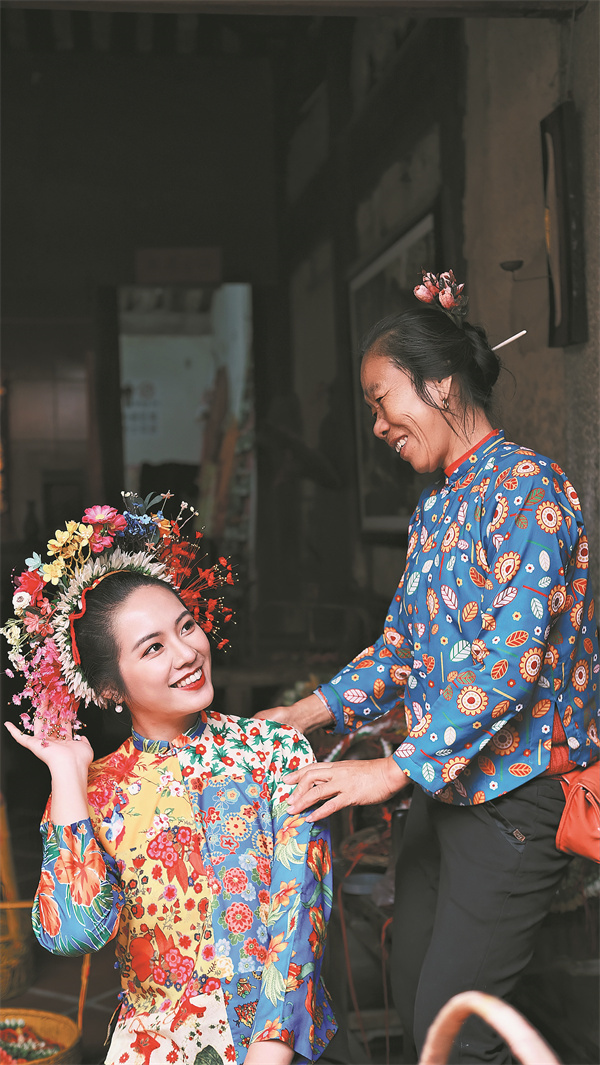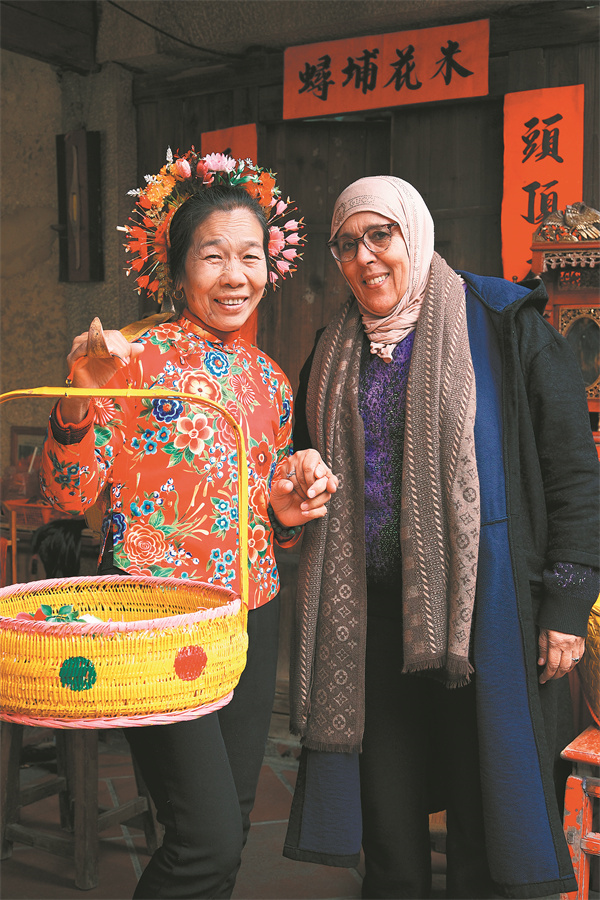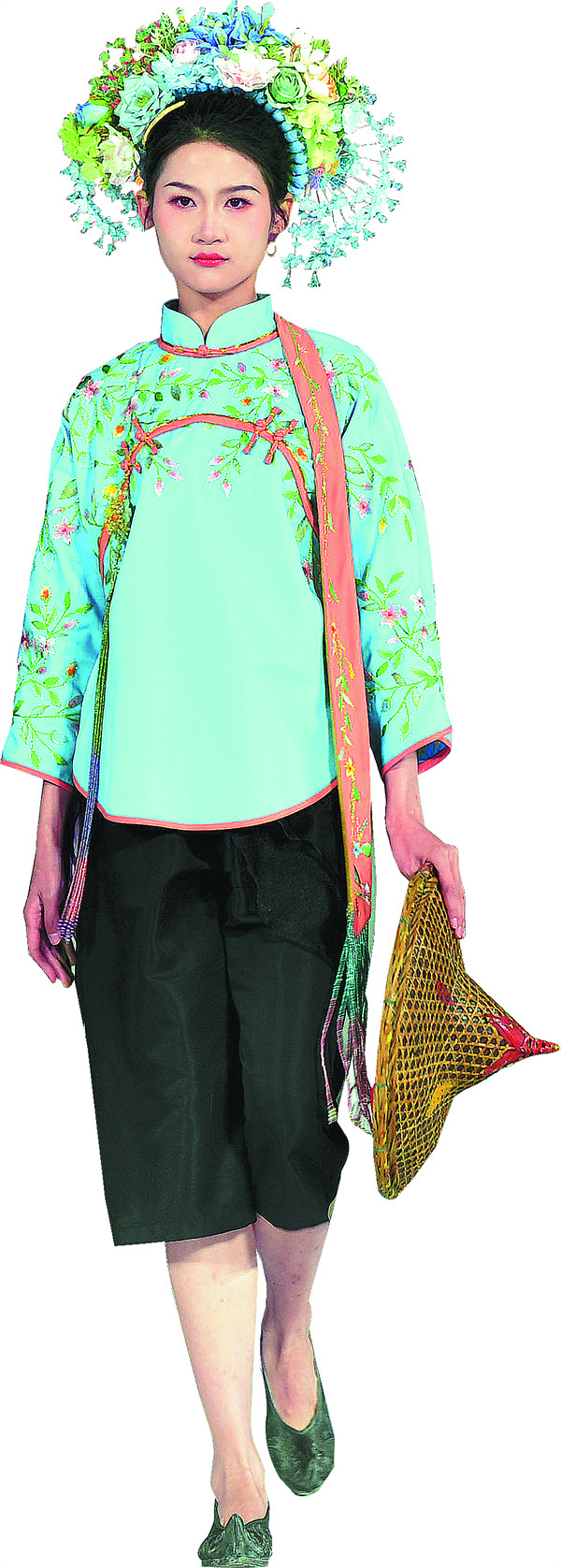Floral ornaments crowning attraction of fishing village

In Xunpu, Fujian province, appeal of traditional headdress is boosting tourism, expanding cultural curiosity

As a child, Huang Rongbing used to watch his mother glide a wooden comb through her long, thick hair, which was as black as calligrapher's ink.
"That was the first thing she did every morning before washing her face and brushing her teeth. She usually put some hair oil on her comb, making her long hair smooth and neat. Her hair was very long, about knee length. She often pulled her hair back tight, rolled it around two fingers and formed a bun on the back of her head," recalled Huang, 34. "Then she would put colorful flowers on her head as accessories, which was very beautiful."
All the women in the small fishing village of Xunpu in Quanzhou, Fujian province, where Huang was born and grew up, had long hair like his mother tied in a bun and adorned with flowers. The colorful and distinctive floral headdress is known as zanhua or zanhuawei.
There is an old saying in Xunpu, "put flowers in your hair in this life and you'll also be pretty in the afterlife".
The head ornament has become an inspiration and provided a career for Huang.
In 2016, he and his older sister opened a salon called Xunpu Huami where tourists could have their hair done in zanhua style and get their photos taken.
With over 100 customers a day, Huang eventually turned the salon into a cultural center, which gave female visitors the opportunity to put on the traditional clothes worn by local women to introduce them to the village's culture.
Xunpu is located about 10 kilometers southeast of the city center of Quanzhou — one of the most important ports of the ancient Maritime Silk Road, which was added to UNESCO's World Heritage List in 2021. In the past, many oceangoing vessels anchored in Xunpu to transport silk, tea and porcelain to countries and regions around the globe, according to the Quanzhou government's official website.

Oyster house
Huang's mother, Weng Xiuzhen, 61, whose hair has remained black and luxuriant, lives in a house made of oyster shells, an eye-catching building in the village that attracts tourists. Oyster shell houses are resistant to water penetration and woodworm damage. The villagers favor them as a building material as they are warm in winter and cool in summer.
"My mother helps out at the center," Huang said. "She still wears the traditional clothes and zanhua on her head.
"She cannot speak Mandarin and only speaks the Hokkien dialect. When the tourists thank her for doing the zanhua head decoration, she always smiles back. She is also a star of the village because many tourists take photos with her."
Most of Huang's customers are young women who travel from different parts of the country to experience the village's unique culture. When Huang's business first opened, only about 20 people visited. But things changed dramatically in 2022 thanks to celebrities who visited the village and posted photos of themselves on social media wearing the floral headdress.
Actress Zhao Liying visited Xunpu and appeared in a Chinese magazine in a red traditional dress and wearing flamboyant head ornaments. With over 90 million followers on her social media account on Sina Weibo, Zhao also appeared in a video sharing her experiences in Xunpu. Captivated by the stunning images, visitors flocked to the village.
With more than 57 million followers on his Sina Weibo platform, pop star Xue Zhiqian also put on a zanhua when he performed in Quanzhou last September.
"After Zhao and some other celebrities came to our village, more and more tourists have come here to experience the traditional culture of Xunpu, especially zanhua," Huang said. "We have been fully booked and now there are over 200 businesses offering services to dress tourists with a zanhua."

Star attraction
Huang spoke with China Daily on March 9, the same day the village held a grand celebration and worship ceremony at Mazu Temple. During the event, which is held on the 29th day of the lunar calendar every year, participants seek blessings from Mazu — the goddess and protector of seafarers. To mark the annual occasion, village women turned out in traditional costumes that featured the floral head decorations.
Huang said the head ornaments his business offers to tourists are quite different from the zanhua that his mother's generation had worn.
In the past, women of the village rarely cut their hair. Huang said as far as he knew, his mother only cut her hair twice in her life — once when she turned 14, as part of a ceremony to mark her becoming an adult, and the other time when she got married.
"Now, when tourists come to us, we usually have to use wigs since most of the tourists' hair is not long enough to turn into a bun," he said.
To have the zanhua appear more colorful, he usually combines real flowers with artificial ones. In his mother's time, women usually wore real flowers, and used different types of flowers to distinguish married women from single ones.
Huang said the rise in tourist visits had not only made him happy from a business perspective, but also because more people were starting to learn the history and culture behind zanhua headwear.
"Earning a reputation for their hard work, resilience, and compassion, the women of Xunpu are renowned for harvesting the highest quality seafood. They deliberately adorned themselves with floral headpieces not only for beauty, but also as a symbol of happiness," said Huang.
He said his mother was like most of the hardworking women in the village. "They took care of their families, raised the children, and did as much as they could to make extra income to support their families, while their husbands caught fish in the ocean," said Huang.
"When they put a zanhua on their heads, they expressed their wish to pursue happiness. The flowers are seen as a symbol of hope," he added.
Respecting tradition
Yin Siqi is one of Huang's customers and posts travel and food videos about the village on her social media platforms. Born and raised in the Guangxi Zhuang autonomous region, Yin learned about Xunpu and its culture after moving to Quanzhou to study at university.
She paid her first visit to the small village in 2019 and met Huang. "There is a beautiful coast near the village and it's easy to find Huang's home because of the oyster shell house his family lives in, which is very noticeable," said Yin, 35, who now lives in Quanzhou after graduating and becoming a social media influencer.
One of the things that impressed Yin was the story of Huang's older sister, who married a Moroccan man and had a grand, traditional wedding in the village.
"I saw pictures of Huang's older sister's wedding. She wore very traditional clothes and a zanhua, which looked very beautiful. The couple looked very young. It was very touching that the bride respected her background and family traditions and the groom also loved the unique culture," Yin said.
In 2021, Yin donned a zanhua for the first time at Huang's salon. Huang's mother put flowers on Yin's bun, which formed a circular shape that symbolized unity, perfection, and completion.
Yin returned to the village several times and took photos of herself in traditional Xunpu dress and wearing a zanhua. One of her social media posts received over 40,000"likes" and was viewed more than 2 million times. Her photos also attracted invitations from the media for interviews as well as advertising companies to cooperate on endorsements.
"I have seen many young people come to Xunpu for zanhua. They match the head decorations with their own style, especially Chinese-style clothes such as the traditional skirt called the mamianqun, which literally means 'horse-face skirt' and is one of the favorites among younger generations," Yin added.

Modern twist
In 2022, Hu Titi traveled from Guiyang, Guizhou province, to Quanzhou, to visit Huang's mother Weng and undergo the full zanhua experience. She learned how to comb her hair and how to use hairpins to form a stable bun in order to decorate her head with flowers.
"Besides exploring the natural landscape, old architecture, and customs and traditions of the village, I also gained in-depth knowledge about Xunpu, where tradition and modernity merge," said Hu.
Last year, she went to Paris and under the Eiffel Tower shot photos and videos of herself dressed in traditional Chinese clothes and a zanhua. She also offered passersby the opportunity to try on the headdress.
In April 2023, Huang Yimei and a fellow Quanzhou native, opened one of the first zanhua stores in Hangzhou, Zhejiang province. The business is located by a riverside, which is home to restaurants and coffee shops that are popular with young people.
Huang Yimei combines zanhua headwear with clothes from the Song Dynasty (960-1279) as Hangzhou served as the Southern Song capital from 1127 and 1279.
Her customers include older women, and many mothers and daughters like to have photos taken of their hair being prepared in the zanhua style.
"Customers come from 9 am to 10 pm," she said. "I didn't go back to my home in Quanzhou during Spring Festival this year because of the rising number of customers."
Zhang Wencheng, from Yong'an county, Fujian province, has a PhD from Hong Kong Polytechnic University's School of Hotel and Tourism Management. From 2017 to 2019, he traveled to Xunpu more than 10 times to do research for his doctorate.
"The centuries-old fishing village and the people's traditional lifestyle are not fading away," Zhang said, adding that Xunpu's history dates back over 800 years.
"The local people's lifestyle is closely associated with and affected by the ocean. The women of Xunpu village shouldered much more responsibility than the men in the families as the men were usually not at home," Zhang said.
He said he met a woman in Xunpu in 2018 who was in her 80s and whose teeth were almost all gone. She wore a bright shirt and had flowers on her head.
"She sang folk songs for me, expressing women's struggle without their husbands at home. After she finished her song, she told me that despite all the hardships, she still felt happy and full of hope."
When he returned to visit the elderly woman in 2019, she had died. Zhang compared the spirit of Xunpu women to the ocean, which is "vast, broad, generous and tolerant".




